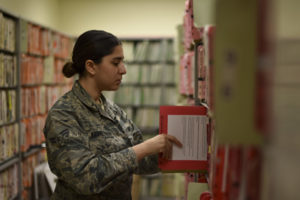DoD Bidirectional Information Sharing Was Launched, However

Airman 1st Class Caroline Karaverdian, 9th Medical Group outpatient technician, files a folder in the patient health record department at the clinic at Beale Air Force Base, CA, earlier this year. The 9th MDG is scheduled to become all-digital with the MHS’ GENESIS system. The VA is working on data sharing with that system. Air Force photo by Senior Airman Valentina Viglianco
WASHINGTON—The rollout of VA’s new electronic health record system has been delayed again, this time due to the coronavirus.
Just prior to the outbreak of COVID-19 in the United States, VA had announced it was delaying the rollout until July—the second such delay in a year. Now, as VA facilities turn their full attention to addressing the pandemic, the rollout has been delayed indefinitely.
In a letter sent by VA Secretary Robert Wilkie to congressional leaders last month, he said that the pandemic has shifted the department’s priorities.
“With VA medical centers relocating staff to manage veteran patients with COVID-19, I’ve directed the Office of Electronic Health Record Modernization (OEHRM) to immediately shift to a non-intrusive posture with VA healthcare operations to allow our frontline clinicians to focus on veteran care,” Wilkie wrote.
Not only is the attention of critical staff members being taken up by the pandemic, but bringing in nonessential personnel to provide EHRS training or infrastructure would expose them and hospital staff to possible infection.
Congressional overseers were understanding of the delay. Over the last few years as this project as approached roll-out, legislators have regularly told VA leaders that, given the department’s history of rushing large IT projects to completion only to have them fail, VA should err on the side of caution as long as they are transparent in their decision-making.
“As we’ve said many times before, if VA is not ready the Electronic Health Record Modernization project should be delayed,” declared House VA Committee Chairman Rep. Mark Takano (D-CA) in a statement following VA’s announcement. “The COVID-19 pandemic is a clear reason to postpone given the critical need to have EHRS staff on the frontlines in the fight against coronavirus.”
He added, “But as this emergency passes, we must make sure that VA does not lose sight of the need for strong employee engagement. Failure to communicate with these employees was a significant factor that contributed to the initial implementation delay.”
Wilkie assured legislators that the system would be ready to roll out at its pilot location—the Mann-Grandstaff VA Medical Center in Spokane, WA—when the crisis passes and VA facilities move to a post-pandemic footing. Both the core EHRS software and the clinician training process are at 99% completion, he said, and VA has completed design, build, connectivity, and technical testing for 72 of 73 of the interfaces required for the system to go live.
Wilkie also said that VA, along with EHRS manufacturer CERNER and other partners would be analyzing any impact COVID-19 might have on the rollout.
Continue Reading this Article: Information Exchange
